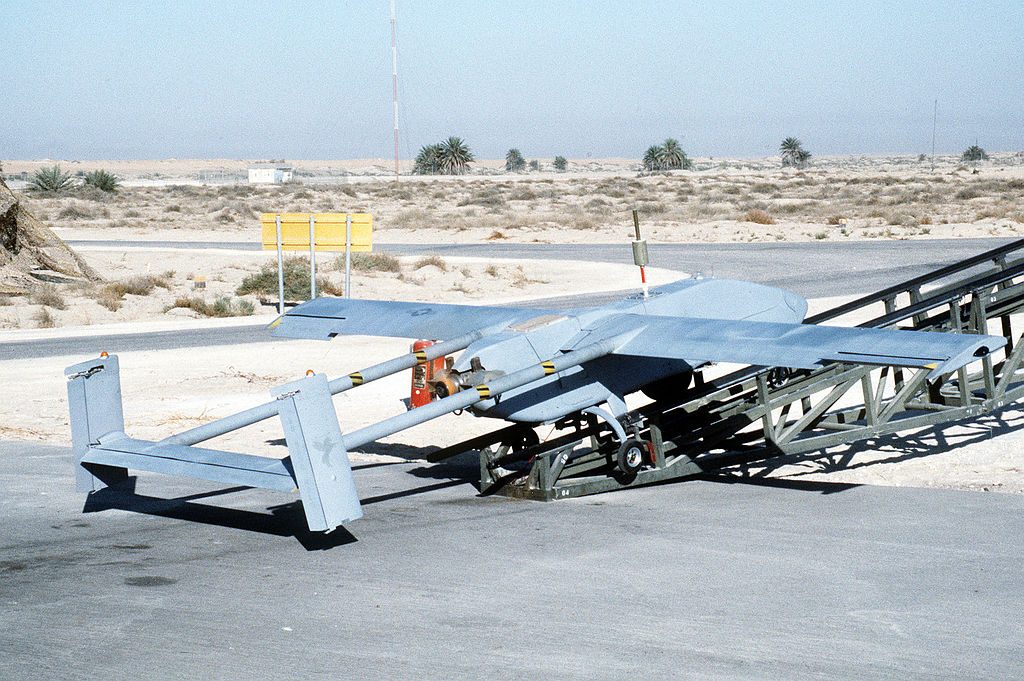 A Pioneer remotely piloted vehicle (RPV) assigned to the Marine Corps' 3rd RPV Platoon on launch rail during 1990 "Operation Desert Shield." U.S. Marine Corps photo. Public domain.
A Pioneer remotely piloted vehicle (RPV) assigned to the Marine Corps' 3rd RPV Platoon on launch rail during 1990 "Operation Desert Shield." U.S. Marine Corps photo. Public domain. This article is a summary report on the Eighth Workshop on the Social Implications of National Security Series. This year’s workshop was held on “Remotely Piloted Airborne Vehicles and Related Technologies,” on September 29–30, 2014, at the University of Melbourne, Victoria, Australia. The workshop was featured as part of the larger Carlton Connect Conference: Challenges, Partnerships, Solutions.
The aim of the workshop was to further develop the dialogue promoted by the Unmanned Airborne Systems and Public Safety: Capabilities, Uses and Regulation conference held at Flinders University in February 2014 by Professor Andrew Goldsmith. That conference examined the current state of unmanned aerial systems (UAS) capabilities and applications in civilian contexts and explored the implications of their use for the future.
The Melbourne workshop provided a forum for discussion around:
- the properties of remotely piloted airborne vehicles (RPAVs);
- the different types of unmanned aircraft and aerial systems currently being deployed or in development;
- the challenges and risks posed by the use of RPAVs;
- safety regulation as applied to the manufacture and civilian use of RPAVs;
- the nature of RPAV surveillance and other missions; and
- how these impact on important societal values in Australia and the United States.
The workshop considered the RPAV as a platform, the mission capabilities of platforms and their “payloads” (current and potential), and the integrity of related technologies that enable them to operate remotely. The potential for future developments in those technologies and capabilities, such as the ability for hostile agents to take control of and autonomously direct airborne systems against the better interests of mankind, was also discussed as was the issue of operator integrity, including the potential for incompetent, reckless, mischievous, malicious, and criminal use of RPAVs.
The workshop brought together a select group of experts and thought-leaders intimately familiar with the societal challenges and implications of the rapidly expanding use and sophistication of RPAVs and their related technologies. Participation was restricted to 20 invited experts (including two from the United States) and members of the Workshop Organizing Committee, whose collective expertise covered the spectrum of legal, insurance, regulatory, operators (military, commercial and private), and technology (industry and academia) relevant to the technological development, manufacture, acquisition and operation of RPAVs and related technologies.
The top three key conclusions of the workshop were:
- there is a need for a universal vocabulary that facilitates the international dialogue on RPAVs at all levels;
- there is a need for a clear and robust international framework for the certification of RPAVs and licensing for their intended use; and
- while there are countless proposed uses across the vast range of RPAVs, not all are appropriate.
The major outcome of the workshop will be a communique that will inform the preparation of SAF05 reports and CTAP position papers on the social and national security implications of RPAVs and related technologies for submission to the Australian and United States governments.
ACKNOWLEDGMENT
The Eighth Workshop on the Social Implications of National Security Series was a joint activity of the SSIT Australia Chapter, the University of Wollongong (UOW), the Australian Council of Learned Academies (ACOLA)’s Securing Australia’s Future Project 5 (SAF05), the Carlton Connect Initiative (CCI), the IEEE-USA Committee on Transportation and Aerospace Policy (CTAP), and the Australian Defence Science Institute (DSI).
Author
Philip Hall is Adjunct Professor at The University of Western Australia; Chair, SSIT Australia Chapter; and SSIT Member on CTAP; email: philip.hall@ieee.org.






 JOIN SSIT
JOIN SSIT